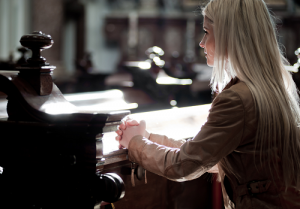 Mary Rice Hasson, J.D., a Fellow in the Catholic Studies Program at the Ethics and Public Policy Center, Washington D.C., and director of the Women, Faith, and Culture project together with Michele M. Hill who has been active in apostolates within the Archdiocese of Baltimore, have issued a preliminary report, What Catholic Women Think About Faith, Conscience, and Contraception, in which 824 church-going Catholic women ages 18-54 were surveyed.
Mary Rice Hasson, J.D., a Fellow in the Catholic Studies Program at the Ethics and Public Policy Center, Washington D.C., and director of the Women, Faith, and Culture project together with Michele M. Hill who has been active in apostolates within the Archdiocese of Baltimore, have issued a preliminary report, What Catholic Women Think About Faith, Conscience, and Contraception, in which 824 church-going Catholic women ages 18-54 were surveyed.
While the data indicates that most Catholic women do not fully support the Church’s teachings on contraception, the results also do not show the sweeping rejection of Church teaching the media portrays either. This first report provides some useful insight. From their website, Women, Faith and Culture: Exploring What Catholic Women Think:
Catholic Women and Faith
90% say faith is important to daily life
72% rely on homilies to learn the faith
28% have gone to Confession within the year
Catholic Women and Contraception
33% think the Church says “yes” to contraception
13% say “yes” to Church teaching
37% say “no” to Church teaching
44% say “no, but maybe …” to Church teaching
The report shows that about one-third of church-going Catholic women incorrectly believe that couples have the right to decide for themselves the moral acceptability of contraception regardless of Church teaching. When Church teaching was explained, 44% were receptive to learning more. These results suggest the problem is in part catechetical, and that women want more instruction. Church-going Catholic women fall into three groups, the researchers found: 1) “the faithful” who say “yes” to Church teaching, 2) “the dissenters” who say “no” to it, and 3) the “soft middle” who are reluctant to go all the way either way, and are receptive to more information.
The hope for this project is that good conversations can begin about how to reach the women who identify as Catholic but reject Church teaching on contraception, and yet, still in their heart want to do the right thing. Mary and Michele also hope that the data will inspire our priests to have confidence to preach the truth on this issue. While 72% of women said that the homilies in Mass are their primary source for learning about Church teaching, more than eight in ten said they believe they can be “good Catholics” even if they “do not accept some of the Catholic Church’s teachings on sex, family planning, birth control, and reproduction.” They seem to be listening, but not accepting.
The researchers also hope that this report can help us in our approach to addressing these topics. I admit, my knee-jerk reaction is to wag a finger at the dissenters and tsk-tsk them for their rebellion, but that isn’t helpful. It’s one of those Golden Rule things. I have to remember, humbly, that I also journeyed in conversion away from a secular contraceptive mindset to a full acceptance of Catholic teaching, and it wasn’t based on one homily or one conversation about obedience. It certainly wasn’t the result of someone belittling me for my ignorance.
It was based on a search for truth that was aided by patient people who would explain what I needed to know – firmly, but in love. It was also aided by people who taught by example. In my parish, I saw the words of the Catechism lived out and I understood, and embraced, the high importance of accepting the gift of children, and raising them in the Sacraments.
These topics have to be approached with sensitivity, focusing on the benefits for women and their relationships. They need help to calibrate their consciences, and this study provides insight into the scope of the problem. Conscience formation, the data strongly indicates, is the real issue underlying the problem, and it is cause for concern. Please take some time to read it, and file it away for reference.
Full report here: What Catholic Women Think About Faith, Conscience, and Contraception
Website here: Women, Faith and Culture: Exploring What Catholic Women Think



